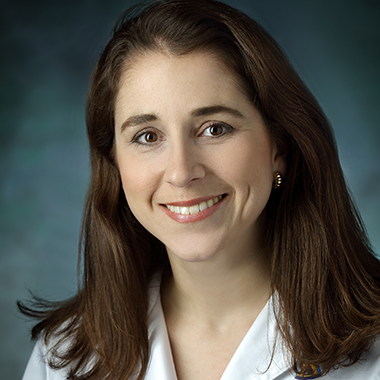Johns Hopkins Researchers Explore Relationships Between Gut Microbiota and Colorectal Cancer
David Muniz Pedrogo, Cynthia Sears and Joanna Melia delve into the topic and consider how an oft-overlooked drug might help treat and prevent colorectal cancer.

Artist's rendering of gut bacteria
Inflammatory bowel diseases (IBD), such as Crohn's disease and ulcerative colitis, can increase the risk of colorectal cancer by as much as three times. A team of gastroenterologists at Johns Hopkins is working to determine the role that the trillions of microorganisms in our digestive tract play in the disease's pathogenesis.
David Muñiz Pedrogo, Cynthia Sears and Joanna Melia published a review article this year in the Journal of Crohn's and Colitis that explores the topic and examines how an often-overlooked drug might have a future in treating and even preventing colorectal cancer.
 Joanna Melia
Joanna Melia"We looked at literature regarding how the microbiome contributes to IBD and colorectal cancer," says gastroenterologist Joanna Melia, an assistant professor of medicine at The Johns Hopkins Hospital and one of the article’s authors. "There’s accumulating evidence that some species of bacteria, either on their own or by colonizing with other bacteria, can release toxins that can cause DNA damage and inflammation in the colon, which can then trigger cancer."
In their review, the authors detail the mechanics of how bacteria such as E. coli, B. fragilis and clostridium difficile, whether by themselves or with other bacteria, can contribute to inflammation and disease.
In addition to identifying specific bacteria, the review examined emerging data that show the importance of interactions between bacteria and gut mucosa.
"Bacteria commonly associated with diseases in humans can be conglomerated in structures called biofilms," write the authors.
Is it that the patient is susceptible to inflammation, and that inflammation attracts certain bacteria that feed off of it and thrive in that environment? Or is it that the bacteria come first, and the bacteria is what triggered the inflammation and the pathway toward cancer?
David Muñiz Pedrogo
Biofilms are aggregations of microbial communities that adhere to the surface of the colon. The environment helps bacteria resist antibiotics, as well as attacks by the host's immune system.
Gastroenterologist and assistant professor of medicine Muñiz Pedrogo points to a debate over which happens first in cases of colorectal cancer: bacteria or inflammation?
"Is it that the patient is susceptible to inflammation, and that inflammation attracts certain bacteria that feed off of it and thrive in that environment?" he asks. "Or is it that the bacteria come first, and the bacteria is what triggered the inflammation and the pathway toward cancer?"
Finally, the review's authors address present IBD treatments and wonder about the role that mesalamine, a drug that has long been used to treat ulcerative colitis, could play in inhibiting the growth of certain carcinogenic bacteria.
Mesalamine, says Muñiz Pedrogo, has been prescribed as a treatment of ulcerative colitis for decades.
"We have all these new biologic drugs for IBD," he says, referring to infliximab, adalimumab and other drugs derived from living cells. "But we don’t entirely understand how or why they work."
In contrast, says Muñiz Pedrogo, mesalamine is a low-cost anti-inflammatory drug that was prescribed more than a million times in 2021 alone.
"We explored some of the literature and data that shows that mesalamine has some antibiotic properties," he says.
He explains that the layers of bacteria that form biofilms can be difficult for antibiotics to penetrate.
"But we’re starting to get a better idea of how mesalamine might translate into something we can either manipulate or use to actually prevent the inflammation that comes with IBD and, perhaps, prevent colorectal cancer altogether."
 Cynthia Sears
Cynthia SearsProfessor of medicine Sears has said that the answers to many of the questions that still surround the pathogenesis of colorectal cancer can be found by conducting more human studies.
"What we've learned from mouse models has been huge," she says. "But if we don't do longitudinal studies in humans, then we're not following what we've learned from the science."
Sears also says that the strongest experimental evidence for biofilms as direct tumor promoters comes from studies of human colon biofilms.
"It's expensive. But that's science, right? Answering questions leads to more questions. And that's what pushes us in the right direction."
Colorectal cancer is the third-most-common cancer in the world and the second-leading cause of cancer deaths. Experts estimate that, in 2018 alone, there were nearly 2 million new diagnoses of colorectal cancer. The disease accounted for as many 860,000 deaths that year.
